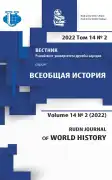Chinese Concepts and Opportunities in Information Warfare: China-US Rivalry in Cyberspace
- Authors: Katkova E.Y.1, Yunyushkina A.S.1
-
Affiliations:
- Peoples’ Friendship University of Russia (RUDN University)
- Issue: Vol 14, No 2 (2022)
- Pages: 197-210
- Section: East and West: contacts and contradictions
- URL: https://journal-vniispk.ru/2312-8127/article/view/317191
- DOI: https://doi.org/10.22363/2312-8127-2022-14-2-197-210
- ID: 317191
Cite item
Abstract
The research is devoted to the emergence of threats to information security and competition in cyberspace between the two largest powers - China and the United States. Over the past ten years, China has been actively developing offensive cyber capabilities, turning into a state with a combat- ready and modern army. Its technological level is behind the United States in many areas, but Beijing is rapidly closing the gap. Today, the information confrontation between these countries is of a strategic nature. Both China and the United States are investing large sums of money in the development of cyber technologies. The authors examine the different approaches of China and the United States to the methods of waging information wars and countering various challenges and threats in cyberspace. In conclusion, the authors come to the opinion that China will actively develop information technologies and build up its strategic potential in this area in the near future, which will lead to tougher competition among major powers in cyberspace.
About the authors
Evgeniya Yu. Katkova
Peoples’ Friendship University of Russia (RUDN University)
Author for correspondence.
Email: katkova-eyu@rudn.ru
candidate of sciences (history), senior lecturer, Department of theory and history of international relations 6 Miklukho-Maklay St, Moscow, Russia, 117198
Anna S. Yunyushkina
Peoples’ Friendship University of Russia (RUDN University)
Email: an.yuniushkina2014@yandex.ru
Master’s student, Department of theory and history of international relations 6 Miklukho-Maklay St, Moscow, Russia, 117198
References
- Buzan B. The Logic and Contradictions of Peaceful Rise. Development as China’s Grand Strategy. The Chinese Journal of International Politics. 2014;4(7):381–420.
- Theohary CA. Information Warfare: Issues for Congress. Washington, DC: Congressional Research Service, 2018.
- Sun Tzu. The Art of War: Chinese Military Strategy. Translated from English. SPb: Dilya publ., 2006. (In Russ.).
- Paterson T., Hanley L. Political warfare in the digital age: cyber subversion, information operations and ‘deep fakes’. Australian Journal of International Affairs. 2020;74(4):439–454.
- Adams J. Virtual Defense. Foreign Affairs. 2001;80(3):98–112.
- Migunov AL. Tendentsii kitayskoy strategii vedeniya informatsionnoy voyny [Trends in Chinese Information Warfare Strategy]. Voyennaya mysl’. 2008;(11):62–67. (In Russ.).
- Military and Security Developments Involving the People’s Republic of China. Annual Report to Congress. Washington, DC: Office of the Secretary of Defense, 2019.
- Yevdokimov YV. Politika Kitaya v global’nom informatsionnom prostranstve [China’s policy in the global information space]. Mezhdunarodnyye protsessy. 2011;9.1(25):74–83. (In Russ.).
- Krekel B. Capability of the People’s Republic of China to Conduct Cyber Warfare and Computer Network Exploitation. Washington, DC: Northrop Grumman Corporation, 2009.
- Cyberpower and National Security. American Foreign Policy Interests. 2013;35(1):45–58.
- Inkster N. Chinese Intelligence in the Cyber Age. Survival: Global Politics and Strategy. 2013;55(1):45–66.
- Ford CA. The Evolution of International Security Capacity Building. U.S. Department of State. 20.11.2020. Available from: https://www.state.gov/the-evolution-of-international-security-capacitybuilding/ [Accessed: 28.12.2020].
- Tai Ming Cheung. The rise of China as a cybersecurity industrial power: balancing national security, geopolitical, and development priorities. Journal of Cyber Policy. 2018;3(3):306–326. https://doi.org/10.1080/23738871.2018.1556720
- Military and Security Developments Involving the People’s Republic of China 2013. Annual Report to Congress. Washington, DC: Office of the Secretary of Defense, 2013.
- Chuck Hagel. Speech At The Shangri-La Dialogue, June 1, 2013. USC US-China Institute. 01.06.2013. Available from: https://china.usc.edu/chuck-hagel-%E2%80%9Cspeech-shangri-ladialogue%E2%80%9D-june-1-2013 [Accessed: 28.12.2020].
- Béraud-Sudreau L. Assessing Chinese defence spending: proposals for new methodologies. International Institute for Strategic Studies (IISS). 31.03.2020. Available from: https://www.iiss.org/blogs/research-paper/2020/03/assessing-chinese-defence-spending [Accessed: 28.12.2020].
- Popov IM. Voyna budushchego: vzglyad iz-za okeana: Voyennyye teorii i kontseptsii sovremennykh SSHA [War of the Future: A View from Overseas: Military Theories and Concepts of the Modern United States]. Moscow: Tranzitkniga, AST, Astrel’, 2004. 443 p. (In Russ.).
- Panarin IN. Informatsionnaya voyna, PR i mirovaya politika [Information warfare, PR and the world politics]. Moscow: Goryachaya liniya Telekom, 2006. 351 p. (In Russ.).
- Koshurnikova NA. Osobennosti informatsionnoy politiki sovremennogo Kitaya [Features of the information policy of modern China].Kitay: istoriya i sovremennost’: materialy IX mezhdunarodnoy nauchno-prakticheskoy konferentsii. Yekaterinburg, 21–23 oktyabrya 2015 g. Yekaterinburg: Izdatel’stvo Ural’skogo universiteta, 2016. P. 279–284. (In Russ.).
- Panarin IN. Tekhnologiya informatsionnoy voyny [Information war technology]. Moscow: KSP+, 2003. 319 p. (In Russ.).
- Dimlevich N. Informatsionnyye voyny v kiberprostranstve – Kitay i Indiya [Information Wars in Cyberspace – China and India]. Mezhdunarodnaya zhizn’. 03.02.2011. Available from: https://interaffairs.ru/news/show/614 [Accessed: 28.12.2020]. (In Russ.).
- Kennedy AB. Can the Weak Defeat the Strong? Mao’s Evolving Approach to Asymmetric Warfare in Yan’an. The China Quarterly. 2008;(196):884–899.
- Starkin SV. Vliyaniye geopoliticheskoy sredy na transformatsiyu kontrrazvedyvatel’noy paradigmy spetssluzhb SSHA [The influence of the geopolitical environment on the transformation of the counterintelligence paradigm of the US intelligence services]. Vestnik Bryanskogo gosudarstvennogo universiteta. 2011;(2):130–134.
- Wang Baocun, Li Fei. Information Warfare. Federation of American Scientists. 20.06.1995. Available from: https://fas.org/irp/world/china/docs/iw_wang.htm [Accessed: 28.12.2020].
- Lotrionte C. Countering State-Sponsored Cyber Economic Espionage Under International Law. North Carolina International Law and Commercial Regulation. 2014;40(2):443–541.
- Joske A. Picking Flowers Making Honey. The Chinese military’s collaboration with foreign universities. The Australian Strategic Policy Institute. 30.10.2018. Available from: https://www.aspi.org.au/report/picking-flowers-making-honey [Accessed: 28.12.2020].
- Iasiello E. China’s Three Warfares Strategy Mitigates Fallout from Cyber Espionage Activities. Journal of Strategic Security. 2016;9(2):45–69.
- Taiwan 2020 Polls. Datawrapper. 2020. Available from: https://www.datawrapper.de/_/3piBg/ [Accessed: 28.12.2020].
- Kurlantzick J. How China Is Interfering in Taiwan’s Election. Council on Foreign Relations. 07.11.2019. Available from: https://www.cfr.org/in-brief/how-china-interfering-taiwans-election [Accessed: 28.12.2020].
- Nichiporuk B. U.S. military opportunities: information-warfare concepts of operation. Strategic appraisal: the changing role of information in warfare. Santa Monica: RAND Corporation, 1999. P. 179–215.
Supplementary files









